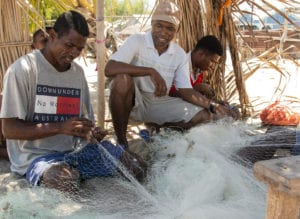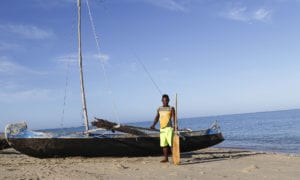Sarodrano is located about fifteen kilometers south of the city of Toliara, on a peninsula between the ocean and the cliffs. Sarodrano's landscape is dominated by dunes, small houses—often wooden with tin or grass roofs—and coconut trees. Like in many of the fishing villages, in Sarordano, pirogues lie everywhere—from the white-sand beach to the blue-green clear ocean. Sarodrano is part of TAMIA LMMA, an association supported by GIZ and groups together nine villages in the commune of Betsinjake. The LMMA is an active member of the MIHARI Network. TAMIA stands for Tahosoa Anandriake Mitambatse Ianantsono Andatabo, which roughly translates to “people of Ianantsono and Andatabo come together for a better future.”
The association was created mainly to protect and manage the coastal areas around the Tsinjoriake protected area, which covers 15,000 acres of dramatic costal limestone plateau, known for its dwarf vegetation and a beautiful swimming cave. Other activities of the association include the promotion of alternative livelihoods, temporary fish reserves, and mangrove reforestation and management. Local management initiatives are enforced through what is called dina or local customary laws, sets of mutually agreed upon rules that are promulgated by the Malagasy state and whose violation will lead to fines.
EVELYNE, FISHMONGER
Please note that the quotes included come directly from individuals interviewed. Sentences are edited a minimal amount to ensure clarity while maintaining the sentiments of the quotes as originally intended by the individuals.

Photo by Faniry Njava
"I am a “mpanangy” (fishmonger), like my mother and her mother before her. It’s the only job that I know how to do. My mother taught me everything about this trade. Every day by 4am, I buy fish from the fishers who are just coming back…then, I sell to intermediaries. [They] collect fish by the road outside of the village and sell them in Toliara. Once back at home, I do house chores and go back to buy and collect more fish to sell at the Toliara markets. By 2pm, I take a pirogue for Toliara and open a stall at the market in the city. I often leave the market around 8pm and take the pirogue home. I usually get home by 11 pm or 12pm when the weather is bad. Sometimes, when unable to sell the fish, I go back [home] to Sarodrano the next day. I am used to doing my job, but I don’t wish that my daughter become a mpanangy. It’s [physically] too demanding and I don’t think she can take it. The fish stocks at sea are not as full as they were during my mother’s time, and they continue to decrease with the increase in the number of nets at sea. Now that my daughter goes to school, she has more opportunities than the ones I had. I would like her to become a nurse."
JEAN GABRIEL, FISHER, PRESIDENT OF THE ST AUGUSTIN FISHING COMMUNITY (ONE TAMIA VILLAGE)
Please note that the quotes included come directly from individuals interviewed. Sentences are edited a minimal amount to ensure clarity while maintaining the sentiments of the quotes as originally intended by the individuals.

Photo by Nebiat Assefa Melles
The association of TAMIA was interested in joining MIHARI because of the power imbalance [in the society]. If an individual association tries to enforce a dina [customary law] …on someone who is very connected, it will not be as effective. If you are with a network, you face and convince the antagonist as a group and not alone, which is more powerful and effective. One example of this disparity is the [temporary] fish no-take zone in the TAHOSOA association. [Before joining MIHARI], the community had agreed to open the reserve one day, however the night [before], non-community members from the city of Toliara broke the reserve and took all the fish. The community chased them to Toliara and caught them. But the community members had to release them, since these non-community members had powerful relatives.
We filed complaints to the The Tuléar Fishing Communities Support Project (PACP), [the local representative of the Ministry of Fisheries], and to the gendarme (armed law enforcement agents deployed in rural part of some French speaking countries), but they said our complaint was not strong enough because [we] did not have enough proof. If the offenders had been part of the community, then [individuals who enforce Dina] would punish them, as the community has jurisdiction over the geographic area it covers. But, as the offenders were not from the community and fled, [representatives] needed to ask the court to enforce the law. If the association had been part of the network during that time, they would have asked MIHARI to support them in their complaint to PACP and the Ministry of fisheries. It would have been more powerful to address this as a group, rather than as an individual association. This is why we think it is very important to be a part of MIHARI—to be able to come together and support each other in such instances, and when facing powerful institutions.”

Photo by Nebiat Assefa Melles
ARNO, FISHER
Please note that the quotes included come directly from individuals interviewed. Sentences are edited a minimal amount to ensure clarity while maintaining the sentiments of the quotes as originally intended by the individuals.
“I used to work for a vazaha [a foreigner] as a gardener back in 2006. However, when I came back here, I picked up our traditional way of making a living. I would rather be a fisher than a gardener because, [as a fisher], I can make money every day. Sometimes I make up to Ar. 600,000 ($171) or Ar. 700,000 ($200) * in a day. In a month I could make up to Ar 10,000,000 ($2,857). This allows me to buy pigs, everything that we need in the house, a couch, or a pirogue. I do see that the [number of] fish we catch has decreased, given the increase in the number of nets at sea. Before there were few nets, but now, there are more than 50 or 100 nets. These leaves only a100-meter square radius for each person [to fish]. But the prices of the fish have also increased, which is why this is [still] profitable for us. For example, the price of a kilogram of calamari used to be Ar. 2,000 ($.57), but now it is Ar.12,000 ($3.43).”
*According to the World Bank, about 75% of Madagascar's population lives with less than $1.90 per day, making Madagascar among the economically poorest countries in the world.

Photo by Nebiat Assefa Melles
For more information on the MIHARI Network and to find out how you might become involved, please visit https://mihari-network.org/ or contact them at [email protected].
Read the article on Rebeka Ramangamihanta's blog



